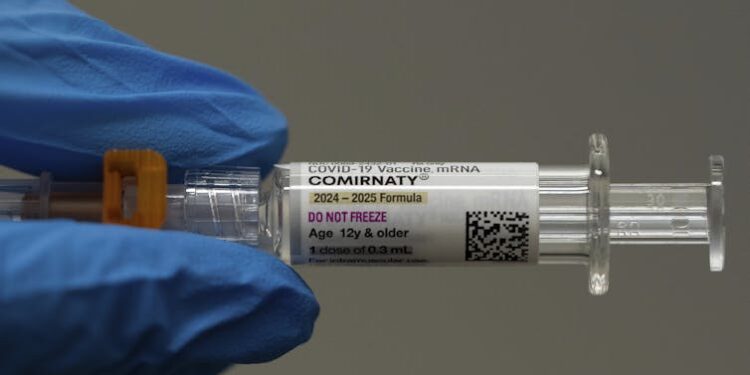As the world marks World Immunization Week, attention turns once again to the lifesaving power of vaccines.
Amid headlines about rising cases of measles, falling vaccination rates and growing vaccine hesitancy, a quieter revolution is underway — one that could fundamentally reshape how we respond to global health threats, including pandemics and cancer.
This revolution is being powered by RNA technology — and Canada is uniquely positioned to lead it.
Table of Contents
A made-in-Canada breakthrough
While the swift development of COVID-19 vaccines appeared to be a sudden scientific triumph, it was built on six decades of foundational work. Much of that work happened in Canada. Messenger RNA (mRNA) are large, negatively charged molecules that are easily degraded and repelled by our cells.
To coax our cells to internalize them, scientists developed a way to encapsulate them in “fat bubbles” or lipid nanoparticles (LNPs), which were invented by Pieter Cullis and collaborators. Cullis, a co-author of this article, is a professor in biochemistry and molecular biology at the University of British Columbia.
Once inside a patients’ cells, the mRNA gives the cell instructions to translate a viral protein that triggers an immune response. Both the Pfizer/BioNTech and Moderna vaccines — which relied on these fat bubbles — were found to be highly efficacious (more than 94 per cent) and safe, both in initial trials and continuous monitoring over time. They were estimated to have saved nearly 10 million lives in 2021 alone.
That’s just the beginning. Research teams across the country are now building on this homegrown innovation to expand the potential of RNA vaccines beyond infectious diseases.
(AP Photo/Jenny Kane)
The next generation: Less means more
At the University of British Columbia, the Blakney Lab is focused on developing vaccines and therapies using self-amplifying RNA (saRNA), a technology that offers several advantages over conventional mRNA. Because saRNA replicates itself once inside a patient’s cells, much smaller doses are needed to produce a robust immune response.
Now, this replication process may sound like something out of a science fiction film, but similar to mRNA vaccines, this technology has been developed over decades and has been thoroughly clinically validated. The saRNA technology reduces manufacturing costs and makes vaccine production more scalable during global emergencies. Notably, the lower dose can also minimize side effects, potentially reducing the risk of getting a sore arm or having to miss a day of work after vaccination.
Recent pre-clinical studies have shown that saRNA vaccines can offer longer-lasting immunity with smaller doses, and multiple clinical trials are now underway to evaluate their use for influenza, Zika virus and even cancer.
Vaccine equity, health security, economic growth
Expanding Canada’s domestic RNA vaccine capacity is more than just a scientific priority; it’s a public health imperative and economic opportunity. During the COVID-19 pandemic, global supply chain breakdowns exposed the risks of relying on international sources for essential vaccine ingredients and production. Investing in local infrastructure allows for faster and more flexible responses to future outbreaks.
But it’s not just about pandemic readiness. One of the most exciting frontiers for RNA technology is the development of personalized cancer vaccines. These vaccines train the immune system to recognize and attack mutations specific to an individual’s tumour.
In early clinical trials, mRNA-based cancer vaccines — such as those developed by Moderna and BioNTech — have shown promising results, dramatically reducing recurrence rates in melanoma and pancreatic cancer patients.
Canada’s scientific ecosystem is primed to contribute meaningfully to this next generation of therapies. Strengthening our biotech infrastructure could create high-quality jobs, stimulate economic growth and reinforce Canada’s place as a leader in the global bioeconomy.
From crisis to capacity
The COVID-19 pandemic showed us how rapidly science can enable positive public health outcomes — and how easily inequities can widen if infrastructure and access aren’t prioritized.
Despite being home to world-class researchers, Canada lacked the manufacturing capacity to produce its own mRNA vaccines. That gap is now being addressed through substantial recent investments from the government of Canada, but sustaining momentum will require long-term commitment from policymakers and funders.
Equity must also remain at the forefront. Communities in rural, remote and Indigenous regions often face barriers to accessing vaccines — not because of hesitancy, but due to logistical challenges and under-resourced health systems. The Public Health Agency of Canada has emphasized the importance of building trust and tailoring solutions in partnership with these communities.
Vaccine confidence remains another challenge. Post-pandemic surveys reveal that misinformation continues to shape public perceptions, even about long-established vaccines like MMR. Addressing this requires proactive science communication, sustained public education and rebuilding trusted relationships between communities and health systems.
Looking ahead
World Immunization Week offered a chance to celebrate how far we’ve come — but also to ask what comes next. With decades of research leadership, a strong innovation ecosystem and new investments in RNA infrastructure, Canada has the tools to lead the next chapter of mRNA technology development.
Whether it’s fighting the next virus or personalizing cancer therapies for individual patients, RNA technologies hold transformative promise. Seizing this opportunity will require sustained support, policy alignment and a focus on equitable access.
By investing in RNA innovation today, Canada can deliver not just vaccines, but a healthier, more resilient future for all.
Immunity and Society is a new series from The Conversation Canada that presents new vaccine discoveries and immune-based innovations that are changing how we understand and protect human health. Through a partnership with the Bridge Research Consortium, these articles — written by academics in Canada at the forefront of immunology and biomanufacturing — explore the latest developments and their social impacts.
























